Samantha Combs's Blog, page 4
October 22, 2013
The Writer's Alphabet - Q is for Query
Of course, Q is for query. It has to be. I know. I know. The word "query" is the single word that makes writers shake their fists, scream in fury and slam closed their laptops, tears streaming from their face. Okay, maybe it's just me, but queries are freakin' HARD! And if you review what there is on the internet on the subject, you'd still be reading a week from next Wednesday. Let's just say there is a lot out there. Every agent, editor and publisher have an opinion on what the best way to shape one is and if you try to adopt every suggestion, your query will be muddled, massive, and frantic. The best way to create one is to study everything you can.....and then follow your own heart.
However, if that sounds crazy, its because it is. I think I have found a good way and I'll share it with you here. It is by no means the only way, so take what you think might work for you and go from there. Borrowing heavily from my seminar entitled Queries and Loglines and Blurbs, Oh My, this is my take on a query.
WHAT IS A QUERY?
A query is, very simply, a single page letter to an agent, an editor, a publisher, a magazine, etc., that introduces you and your book to the recipient.
There are many formulas that have worked: this is mine.

Break the query into four paragraphs:
The IntroThe HookThe Mini-SynopsisThe Bio
In The Intro, you want to start with why you have chosen this particular agent/publisher/editor to query. Is there a personal connection? Same college? Same town? Have you read that he/she has asked for more middle grade/fantasy/techno-geek stories with animals and yours is exactly that? Or have you met or heard them speak at a conference. Make the first line as personal a connection as you can.
The Hook is harder. You want to capture the agent's attention, not bore her to death with details. Grab him from your first words by proving you are writing about something he has never seen before. Some of the best hooks I have written and read are one simple line. As an example, my most recent release is The Deadlies and this is the hook: At Holly Hills Academy, being rich and pretty can be deadly. The Hook also very often becomes your logline, which also helps birth your pitch. We'll go into both of those in an upcoming blog.
So, back to the mechanics of the query. With The Mini-Synopsis, you want to tell the main story arc of your novel about the main protagonist without giving away the farm. Remember two key points here: Agents love white space and brevity is key. White space means don't have cluttered, crowded paragraphs. And be as precise and tight as you can. If you can say what you need in 20 words, you can do it in 10. Focus on the journey of your main protag. You may have an amazing subplot, but when it comes to the query, subplots need not apply. Too many names, too many storylines, and you are too cluttered and clunky. Sleek and succinct is the name of the game. Edit, edit, edit, and trim the fat. Make that agent not be able to LIVE if they don't get their hands on your manuscript. Force that full request because you teased so convincingly.
Finally, The Bio is about you and one fact: why YOU are the perfect person to have written your story. You don't even have to have street cred or anything published at this point. If you aren't yet published, tell the agent about how you are committed to your passion. Attending conferences? Belong to a writer's or critique group? This is where that information can help.
Last but not least, for your closing, two rules are steadfast. ALWAYS thank the agent for their time, and ALWAYS mention that your completed manuscript is available on request. This proves you have a fully-written book, and also that your Momma raised you right. Both critically important to an agent and generally, in life.
However, if that sounds crazy, its because it is. I think I have found a good way and I'll share it with you here. It is by no means the only way, so take what you think might work for you and go from there. Borrowing heavily from my seminar entitled Queries and Loglines and Blurbs, Oh My, this is my take on a query.
WHAT IS A QUERY?
A query is, very simply, a single page letter to an agent, an editor, a publisher, a magazine, etc., that introduces you and your book to the recipient.
There are many formulas that have worked: this is mine.

Break the query into four paragraphs:
The IntroThe HookThe Mini-SynopsisThe Bio
In The Intro, you want to start with why you have chosen this particular agent/publisher/editor to query. Is there a personal connection? Same college? Same town? Have you read that he/she has asked for more middle grade/fantasy/techno-geek stories with animals and yours is exactly that? Or have you met or heard them speak at a conference. Make the first line as personal a connection as you can.
The Hook is harder. You want to capture the agent's attention, not bore her to death with details. Grab him from your first words by proving you are writing about something he has never seen before. Some of the best hooks I have written and read are one simple line. As an example, my most recent release is The Deadlies and this is the hook: At Holly Hills Academy, being rich and pretty can be deadly. The Hook also very often becomes your logline, which also helps birth your pitch. We'll go into both of those in an upcoming blog.
So, back to the mechanics of the query. With The Mini-Synopsis, you want to tell the main story arc of your novel about the main protagonist without giving away the farm. Remember two key points here: Agents love white space and brevity is key. White space means don't have cluttered, crowded paragraphs. And be as precise and tight as you can. If you can say what you need in 20 words, you can do it in 10. Focus on the journey of your main protag. You may have an amazing subplot, but when it comes to the query, subplots need not apply. Too many names, too many storylines, and you are too cluttered and clunky. Sleek and succinct is the name of the game. Edit, edit, edit, and trim the fat. Make that agent not be able to LIVE if they don't get their hands on your manuscript. Force that full request because you teased so convincingly.
Finally, The Bio is about you and one fact: why YOU are the perfect person to have written your story. You don't even have to have street cred or anything published at this point. If you aren't yet published, tell the agent about how you are committed to your passion. Attending conferences? Belong to a writer's or critique group? This is where that information can help.
Last but not least, for your closing, two rules are steadfast. ALWAYS thank the agent for their time, and ALWAYS mention that your completed manuscript is available on request. This proves you have a fully-written book, and also that your Momma raised you right. Both critically important to an agent and generally, in life.
Published on October 22, 2013 05:00
October 20, 2013
The Writer's Alphabet - P is for Platform
Platform is a word most writers know, and like "edit" or "query" it strikes fear in the author's heart. Not for what it is, but more for what it isn't. That is to say, platform is the thing most writer's don't have. But don't fret. You can make one so easy! I wrote a blog about this a couple months ago that more than covers the issue. I hope you enjoy the reposting.
Friday, August 2, 2013
I started my research the way I always do...with the internet. I was immediately overwhelmed. There were a million sites telling me a million things to do and my mind was boggled.
There was, however, a theme. Thank God.
 I noticed the word "platform" over and over. How it was vital I had one and how all agents look for one. Platform? What the hell was that? And where the hell can I get one? I read on.
I noticed the word "platform" over and over. How it was vital I had one and how all agents look for one. Platform? What the hell was that? And where the hell can I get one? I read on.
Turns out, a platform is not a tangible thing. Who knew? The best description I can give is that platform is really about how someone can find you and learn about what you offer. That may not be the best explanation, but it made sense to me. Platform therefore, is your presence on the internet. In the beginning, my platform was like, nothing. Nada. Zip. Zilch. So, I studied and read some more. Now, a couple years and nine books later, this is my platform:
My facebook pages, both personal and my fan pagesMy Twitter handleMy blogPosts I have made guest-posting on other blogsReviews of my booksMy LinkedIn accountMy Pinterest pagesMy Amazon Author PageMy Smashwords profileBook trailers on YouTube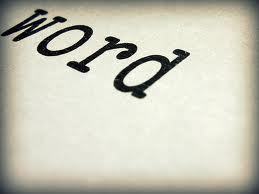 Of course, the best part of my platform is actually my body of work. Each book is a new introduction to me as an author and each story gives me another way to reach new fans, followers, friends, and fellow authors. Every time I get a new written review or I post a new blog, my platform increases. And about the best thing I can figure, it never gets smaller. Win-Win!I may not know everything about building a platform, but I am here to help you, if I can. Happy platform-building!
Of course, the best part of my platform is actually my body of work. Each book is a new introduction to me as an author and each story gives me another way to reach new fans, followers, friends, and fellow authors. Every time I get a new written review or I post a new blog, my platform increases. And about the best thing I can figure, it never gets smaller. Win-Win!I may not know everything about building a platform, but I am here to help you, if I can. Happy platform-building!
Friday, August 2, 2013
I started my research the way I always do...with the internet. I was immediately overwhelmed. There were a million sites telling me a million things to do and my mind was boggled.
There was, however, a theme. Thank God.
 I noticed the word "platform" over and over. How it was vital I had one and how all agents look for one. Platform? What the hell was that? And where the hell can I get one? I read on.
I noticed the word "platform" over and over. How it was vital I had one and how all agents look for one. Platform? What the hell was that? And where the hell can I get one? I read on.Turns out, a platform is not a tangible thing. Who knew? The best description I can give is that platform is really about how someone can find you and learn about what you offer. That may not be the best explanation, but it made sense to me. Platform therefore, is your presence on the internet. In the beginning, my platform was like, nothing. Nada. Zip. Zilch. So, I studied and read some more. Now, a couple years and nine books later, this is my platform:
My facebook pages, both personal and my fan pagesMy Twitter handleMy blogPosts I have made guest-posting on other blogsReviews of my booksMy LinkedIn accountMy Pinterest pagesMy Amazon Author PageMy Smashwords profileBook trailers on YouTube
 Of course, the best part of my platform is actually my body of work. Each book is a new introduction to me as an author and each story gives me another way to reach new fans, followers, friends, and fellow authors. Every time I get a new written review or I post a new blog, my platform increases. And about the best thing I can figure, it never gets smaller. Win-Win!I may not know everything about building a platform, but I am here to help you, if I can. Happy platform-building!
Of course, the best part of my platform is actually my body of work. Each book is a new introduction to me as an author and each story gives me another way to reach new fans, followers, friends, and fellow authors. Every time I get a new written review or I post a new blog, my platform increases. And about the best thing I can figure, it never gets smaller. Win-Win!I may not know everything about building a platform, but I am here to help you, if I can. Happy platform-building!
Published on October 20, 2013 05:00
October 17, 2013
The Writer's Alphabet - O is for Outline
Today's letter is O. There are some great literary terms that begin with this letter. Observation, ode, oxymoron, even the lovely sounding onomatopoeia. The one I have chosen, interestingly, is none of these. Additionally, it is one I have very little familiarity with. Outline.
I am a pantser. That is to say, I write on a wing and a prayer, hoping against hope that each time I open the trusty laptop, the words will come. Happily they have. But I address this post to the more disciplined of my readers. You know who you are. You alphabetize your grocery list, organize recipes according to meal, you even have the easiest time at tax time, since your receipts are all in order. And when you sit down to write your novel, you are more than prepared.
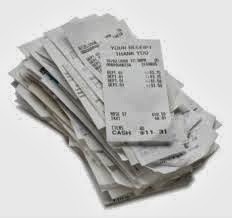
I take this information from my outliner friends. There are serious things to be done actually, even before sitting down to write. You meticulously research your topic. Then you write an exhaustive outline, beginning with the characters and their motivations, then settling into the story arc itself and those motivations. I have author friends who choose the celebrities who best represent their protags and antags, and even go so far as to choose a soundtrack that specifically relates to each scene. When all of this is done, then you sit down to write.
I remember making outlines in school and they were such tedious and detail-filled affairs, I often wondered why couldn't I just get a grade on the outline alone. To me, the resulting paper was just a bunch of the outline ideas strung together with conjunctions. But I cannot deny that most of the novels I have read where the author has outlined have never been any less than amazing. I'm so impressed I have even tried doing it. Epic fail. Seriously. The closest I can come is the notes I pound into my iphone on the notebook icon. See, told you. Epic.
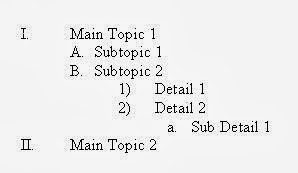 But, if you are one of the lucky few who attempt the outline, best of luck. I know you'll do great! Share with me who you are and we can be friends. In spite of your obvious anal retentive character, I can still be on your side!
But, if you are one of the lucky few who attempt the outline, best of luck. I know you'll do great! Share with me who you are and we can be friends. In spite of your obvious anal retentive character, I can still be on your side!
I am a pantser. That is to say, I write on a wing and a prayer, hoping against hope that each time I open the trusty laptop, the words will come. Happily they have. But I address this post to the more disciplined of my readers. You know who you are. You alphabetize your grocery list, organize recipes according to meal, you even have the easiest time at tax time, since your receipts are all in order. And when you sit down to write your novel, you are more than prepared.

I take this information from my outliner friends. There are serious things to be done actually, even before sitting down to write. You meticulously research your topic. Then you write an exhaustive outline, beginning with the characters and their motivations, then settling into the story arc itself and those motivations. I have author friends who choose the celebrities who best represent their protags and antags, and even go so far as to choose a soundtrack that specifically relates to each scene. When all of this is done, then you sit down to write.
I remember making outlines in school and they were such tedious and detail-filled affairs, I often wondered why couldn't I just get a grade on the outline alone. To me, the resulting paper was just a bunch of the outline ideas strung together with conjunctions. But I cannot deny that most of the novels I have read where the author has outlined have never been any less than amazing. I'm so impressed I have even tried doing it. Epic fail. Seriously. The closest I can come is the notes I pound into my iphone on the notebook icon. See, told you. Epic.
 But, if you are one of the lucky few who attempt the outline, best of luck. I know you'll do great! Share with me who you are and we can be friends. In spite of your obvious anal retentive character, I can still be on your side!
But, if you are one of the lucky few who attempt the outline, best of luck. I know you'll do great! Share with me who you are and we can be friends. In spite of your obvious anal retentive character, I can still be on your side!
Published on October 17, 2013 05:00
October 15, 2013
The Writer's Alphabet - N is for No
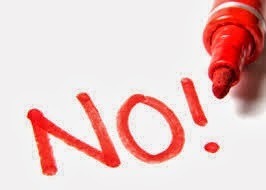 No. No thank you. Not a chance. Nyet. Nada. Not in my lifetime. Not in yours. As a writer, you will hear variations of No in every rejection letter you get. And you will get them. Even Twilight and Fifty Shades of Grey received rejection letters. Stephen King got them. In his book On Writing, he relates that he received so many rejection letters for "Carrie", that he papered one slanted wall in an upstairs room in his home. And we all know what happened with him.
No. No thank you. Not a chance. Nyet. Nada. Not in my lifetime. Not in yours. As a writer, you will hear variations of No in every rejection letter you get. And you will get them. Even Twilight and Fifty Shades of Grey received rejection letters. Stephen King got them. In his book On Writing, he relates that he received so many rejection letters for "Carrie", that he papered one slanted wall in an upstairs room in his home. And we all know what happened with him.So, the word NO is important to you as a writer. I have been asked in the talks I give for aspiring writers how I react to rejection letters. I'm sure they expect me to say I handle them well, and I use every one as a jump start to a wonderful new novel, but that's not what I tell them. I tell the the truth. I am personally offended every time I get one. And I am FURIOUS. I vent and steam and rant and rage and then spent, I sit back down at the computer. Sometimes for revenge's sake alone, I write an seriously good story. A damn good, get-me-a-contract-quick novel. As much as I hate to admit it (truly, i feel physical pain to admit this), that NO I received is the exact thing I have to thank for my great new story. (Ouch).
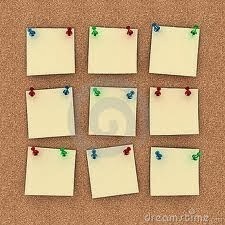
Each time you get a rejection letter, don't wax philosophic about how amazing the damn thing is. Shred it up, throw it in the air and write your epic opus! Or better yet, pin them to a wall in your room. You just never know......*wink*
Published on October 15, 2013 05:00
October 13, 2013
The Writer's Alphabet - M is for Middle Grade
When writing for young adults, one of the single most important things to identify, is your audience and their age. It can be difficult to separate young adult from middle grade from new adult, and you can see from these definitions I found online that there are a
lot
of opinions about it.
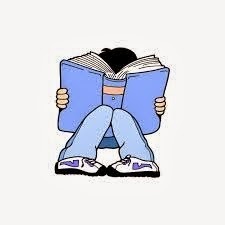
The author of the true, classic middle grade novel does not worry about vocabulary choices or simple sentence structure; once children are ready for these books they are good readers. Middle grade novels are characterized by the type of conflict encountered by the main character. Children in the primary grades are still focused inward, and the conflicts in their books reflect that. While themes range from friendship to school situations to relationships with siblings and peers, characters are learning how they operate within their own world. They are solidifying their own identity, experiencing the physical and psychological changes of puberty, taking on new responsibilities all within the boundaries of their family, friends and neighborhood. Yes, your character needs to grow and change during the course of the book, but these changes are on the inside. Middle grade readers are beginning to learn who they are, what they think. Their books need to mirror their personal experience. (from write4kids.com)
From Joe Monti, literary agent with the Barry Goldblatt Literary Agency (on my A-list):
“The publishing guidelines are traditionally for readers from ages 8-12 for middle grade and 12 & up for YA. My experience, particularly as a retailer cautions that these are soft and it’s closer to 7-11 and 11-17. But adult readership of young adult fiction can be as high as 40% for the most popular titles, but generally makes up 20%-25%.”
From Amanda Rutter, editor at Strange Chemistry, the YA imprint of UK-based Angry Robot Books: “Middle grade is very much about the external, in my opinion. The protagonist reacts to external situations and events, which leads to adventurous stories, and there is little time spent in the characters’ heads. Think books like Percy Jackson and Skulduggery Pleasant. On the other hand, YA is often much more introspective, and the protagonist exerts their influence on the events in the novel. Think first person perspective and lots of use of the word ‘I’. Of course, there are always exceptions to every rule!”
And Michael Stearns, agent and founder of Upstart Crow Literary offers these tips:
* “Middle grade novels tend to be shorter.”
* “Middle grade novels tend to have main characters who are the age of—or slightly older than—the target reader.”
* “Middle grade novels tend to be more outwardly focused: Their plot of events, of things happening to the character, is more important over the course of the book than what happens within the character.”
* “Middle grade novels tend to have a simpler vocabulary and a simpler sentence structure.”
* “Middle grade novels tend to have a single inciting element—the thing that sets the comfortable, given world a-kilter.”
Here is my own definition:
MIDDLE GRADE
Between 20,000-45.000 words. If it's longer and geared to a slightly older audience, but not yet falling under the YA category (think "pre-teen" or "tweener"), you should really refer to the work as upper Middle Grade. Incidentally, several people in the industry that I consider to be In-The-Know have predicted the Middle Grade genre to be The Next Big Thing. The same peeps also now project time travel to be a huge theme. Hmmm. I think I'm writing one now. *giggle*
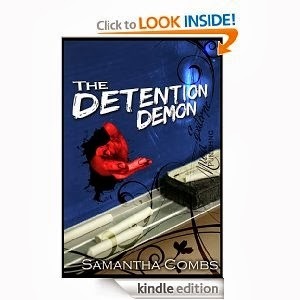
Incidentally, I have tackled the middle grade genre with a book called The Detention Demon. If you get a chance to check it out, let me know how I did. Thanks!
http://www.amazon.com/The-Detention-Demon-ebook/dp/B0077DTQHG

The author of the true, classic middle grade novel does not worry about vocabulary choices or simple sentence structure; once children are ready for these books they are good readers. Middle grade novels are characterized by the type of conflict encountered by the main character. Children in the primary grades are still focused inward, and the conflicts in their books reflect that. While themes range from friendship to school situations to relationships with siblings and peers, characters are learning how they operate within their own world. They are solidifying their own identity, experiencing the physical and psychological changes of puberty, taking on new responsibilities all within the boundaries of their family, friends and neighborhood. Yes, your character needs to grow and change during the course of the book, but these changes are on the inside. Middle grade readers are beginning to learn who they are, what they think. Their books need to mirror their personal experience. (from write4kids.com)
From Joe Monti, literary agent with the Barry Goldblatt Literary Agency (on my A-list):
“The publishing guidelines are traditionally for readers from ages 8-12 for middle grade and 12 & up for YA. My experience, particularly as a retailer cautions that these are soft and it’s closer to 7-11 and 11-17. But adult readership of young adult fiction can be as high as 40% for the most popular titles, but generally makes up 20%-25%.”
From Amanda Rutter, editor at Strange Chemistry, the YA imprint of UK-based Angry Robot Books: “Middle grade is very much about the external, in my opinion. The protagonist reacts to external situations and events, which leads to adventurous stories, and there is little time spent in the characters’ heads. Think books like Percy Jackson and Skulduggery Pleasant. On the other hand, YA is often much more introspective, and the protagonist exerts their influence on the events in the novel. Think first person perspective and lots of use of the word ‘I’. Of course, there are always exceptions to every rule!”
And Michael Stearns, agent and founder of Upstart Crow Literary offers these tips:
* “Middle grade novels tend to be shorter.”
* “Middle grade novels tend to have main characters who are the age of—or slightly older than—the target reader.”
* “Middle grade novels tend to be more outwardly focused: Their plot of events, of things happening to the character, is more important over the course of the book than what happens within the character.”
* “Middle grade novels tend to have a simpler vocabulary and a simpler sentence structure.”
* “Middle grade novels tend to have a single inciting element—the thing that sets the comfortable, given world a-kilter.”
Here is my own definition:
MIDDLE GRADE
Between 20,000-45.000 words. If it's longer and geared to a slightly older audience, but not yet falling under the YA category (think "pre-teen" or "tweener"), you should really refer to the work as upper Middle Grade. Incidentally, several people in the industry that I consider to be In-The-Know have predicted the Middle Grade genre to be The Next Big Thing. The same peeps also now project time travel to be a huge theme. Hmmm. I think I'm writing one now. *giggle*

Incidentally, I have tackled the middle grade genre with a book called The Detention Demon. If you get a chance to check it out, let me know how I did. Thanks!
http://www.amazon.com/The-Detention-Demon-ebook/dp/B0077DTQHG
Published on October 13, 2013 05:00
October 11, 2013
The Writer's Alphabet - L is for logline
Again, a post I have written previously turns out to be the best definition of today's letter. Enjoy.
The first time I went to a writer's conference, my head literally swum with all the buzz words being bandied about. At the time, my first book, Spellbound, was a much-handled manuscript, and two others were as well. It wasn't even a series book yet, a single standalone title. (See how much I didn't know back then?).
Anyway, I sat in on different workshops and found myself writing down all these words and catch phrases to look up later. Two I heard often, after I'd figured out "Query", was loglines and taglines. Elevator pitch came up as well. I nodded sagely every time I heard one, then rushed to a corner to google the damn thing. Even then, I thought the two were interchangeable, called something different maybe by different areas, like an East Coast-West Coast thing. So not the case.
 So, in Part Four of this series, I want to dispel the rumors and misinformation. They are not the same. I know. I was shocked too. Then, embarrassed when I realized how many times I had misused the terms. Here are the proper Webster definitions:
So, in Part Four of this series, I want to dispel the rumors and misinformation. They are not the same. I know. I was shocked too. Then, embarrassed when I realized how many times I had misused the terms. Here are the proper Webster definitions:
Tagline: Web definitionsA tagline is a variant of a branding slogan typically used in marketing materials and advertising.
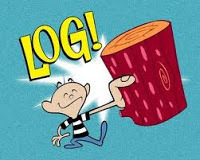 Logline:Web definitionsThe story in one active sentence, focusing on the concept, main character and main conflict. Ideally in 25 words or less..
Logline:Web definitionsThe story in one active sentence, focusing on the concept, main character and main conflict. Ideally in 25 words or less..
My Take:
Tagline: You know how Amazon used to ask you to choose specific words to describe your books? Well, your publisher will still do this. These are the "tags" or words that will call up your book every time someone puts them in an internet search. Words such as YA, paranormal, witch, first love, and supernatural are all tag words that describe my first novel, Spellbound. And here's a HUGE tip: those tag words should appear in the description of your book in your query.
See how everything is annoyingly related? The good news is if you master one concept, you can master all.
The tag words integrate into the logline, which becomes part of your query from which you develop your blurb.
If you are new to the publishing industry, you will hastily learn that these processes are almost the only way a new novel from a new novelist, gets published for the first time. If you have been in the industry for awhile, you now know that these things are a necessary evil. Either way, you have to get your head around them.
Practice explaining your book to yourself in the mirror. What words are you punching? What words are you missing? Oftentimes, a compelling logline will actually appear on the very cover of your book. That was the case with my latest, The Deadlies. My logline:
At Holly Hills Academy, being rich and pretty can be deadly.
My publisher printed it right on the cover! Man, I better love it and be passionate about it. Happily, I am! And the first line of my query AND blurb just expanded on the idea:
When Calliope Flood catches the unwanted attention of the prettiest and most privileged girls at her new school, she learns they are possessed of more than just good ole’ Southern charm; they are also possessed by the demons of the Seven Deadly Sins.
From the tagline "rich and pretty" is echoed in the blurb with "prettiest and most privileged", and the deadly part is expanded upon with the idea of being possessed by the seven deadly sins.
So, here are my steadfast rules for Loglines:
Give the main character an epithet: vengeful divorcee, struggling aspiring writer, etc.Identify your main character's mission and what he stands to lose if he failsBrainstorm words and phrases that conjure up your personal idea of your bookPick 25-30 that sound the most compelling and rightNOW, pick 5-8 of those that sound even betterFashion a tight, 25-word pitch. THAT is your logline.Okay! Now get loggin'!
The first time I went to a writer's conference, my head literally swum with all the buzz words being bandied about. At the time, my first book, Spellbound, was a much-handled manuscript, and two others were as well. It wasn't even a series book yet, a single standalone title. (See how much I didn't know back then?).
Anyway, I sat in on different workshops and found myself writing down all these words and catch phrases to look up later. Two I heard often, after I'd figured out "Query", was loglines and taglines. Elevator pitch came up as well. I nodded sagely every time I heard one, then rushed to a corner to google the damn thing. Even then, I thought the two were interchangeable, called something different maybe by different areas, like an East Coast-West Coast thing. So not the case.
 So, in Part Four of this series, I want to dispel the rumors and misinformation. They are not the same. I know. I was shocked too. Then, embarrassed when I realized how many times I had misused the terms. Here are the proper Webster definitions:
So, in Part Four of this series, I want to dispel the rumors and misinformation. They are not the same. I know. I was shocked too. Then, embarrassed when I realized how many times I had misused the terms. Here are the proper Webster definitions:Tagline: Web definitionsA tagline is a variant of a branding slogan typically used in marketing materials and advertising.
 Logline:Web definitionsThe story in one active sentence, focusing on the concept, main character and main conflict. Ideally in 25 words or less..
Logline:Web definitionsThe story in one active sentence, focusing on the concept, main character and main conflict. Ideally in 25 words or less..My Take:
Tagline: You know how Amazon used to ask you to choose specific words to describe your books? Well, your publisher will still do this. These are the "tags" or words that will call up your book every time someone puts them in an internet search. Words such as YA, paranormal, witch, first love, and supernatural are all tag words that describe my first novel, Spellbound. And here's a HUGE tip: those tag words should appear in the description of your book in your query.
See how everything is annoyingly related? The good news is if you master one concept, you can master all.
The tag words integrate into the logline, which becomes part of your query from which you develop your blurb.
If you are new to the publishing industry, you will hastily learn that these processes are almost the only way a new novel from a new novelist, gets published for the first time. If you have been in the industry for awhile, you now know that these things are a necessary evil. Either way, you have to get your head around them.
Practice explaining your book to yourself in the mirror. What words are you punching? What words are you missing? Oftentimes, a compelling logline will actually appear on the very cover of your book. That was the case with my latest, The Deadlies. My logline:
At Holly Hills Academy, being rich and pretty can be deadly.
My publisher printed it right on the cover! Man, I better love it and be passionate about it. Happily, I am! And the first line of my query AND blurb just expanded on the idea:
When Calliope Flood catches the unwanted attention of the prettiest and most privileged girls at her new school, she learns they are possessed of more than just good ole’ Southern charm; they are also possessed by the demons of the Seven Deadly Sins.
From the tagline "rich and pretty" is echoed in the blurb with "prettiest and most privileged", and the deadly part is expanded upon with the idea of being possessed by the seven deadly sins.
So, here are my steadfast rules for Loglines:
Give the main character an epithet: vengeful divorcee, struggling aspiring writer, etc.Identify your main character's mission and what he stands to lose if he failsBrainstorm words and phrases that conjure up your personal idea of your bookPick 25-30 that sound the most compelling and rightNOW, pick 5-8 of those that sound even betterFashion a tight, 25-word pitch. THAT is your logline.Okay! Now get loggin'!
Published on October 11, 2013 23:12
October 9, 2013
The Writer's Alphabet - K is for Kill Your Darlings
I wrote a blog post about this topic before and am sharing it in it's entirety. As always, I love to hear your opinion and experiences. Enjoy.
If you are a writer, author, or simply aspiring to be published, I am sure you have read Stephen King's not-to-be-missed tome "On Writing". A brilliant how-to/personal journey from the master of all scary things, it is the single reason I decided that my little stories could be more than little stories. I decided that a year and a half ago and now I have six published works.
There are so many lessons I took from that book, it's hard to point them out in one post. But there is one tip that I have never forgotten: Kill Your Darlings. Mr. King invites us to write until our pages overflow on the first draft, intending to please only ourselves. Then, put on your critical hat, take out your bloodiest red pen, and prepare to leave wreckage.
 Kill your darlings means to be able to hit the delete key. And not just for a couple of words. I mean, highlight HUGE chunks and blast them into the stratosphere. It's not easy. After all, you lovingly created those words, gave birth to them, nurtured them. They are your darlings. And you have to kill them. Sadly, they must go.
Kill your darlings means to be able to hit the delete key. And not just for a couple of words. I mean, highlight HUGE chunks and blast them into the stratosphere. It's not easy. After all, you lovingly created those words, gave birth to them, nurtured them. They are your darlings. And you have to kill them. Sadly, they must go.
This hasn't happened to me in a while, but it did last week. I went on an absolute tear, writing for a hours. I thought I had this amazing concept for a story and literally SPILLED words onto the laptop. They couldn't get out of me fast enough and I barely stopped to breathe during the immersion. Then, exhausted, spent, I collapsed into bed.
I woke up the next morning and my first thought was this: the premise didn't work. I crawled out of bed and regarded the laptop hesitantly. The failed story was in there. If I opened it, I had to fix it. I couldn't face it. So i let other things take my attention the remainder of the day and busied my brain away from the story.
And then night came, everyone else went to bed and it was just me and Laptop. Musina was there too and she kept nudging me. She poked and prodded until I flipped open the laptop and knew I had to do it. I had to let my story go. I had to kill my darling.
I re-read it one more time and knew it's time was over. Quickly, before I could lose my nerve, I highlighted the lot, and jammed the delete key. Angrily. It HURTS to kill them. But, I did. And then the most amazing thing happened.....a new idea spattered across my mind. I wrote again, long and obsessed, but this time it was different. I knew I was playing the right notes on my literary piano. I finished a new short story I am proudly calling The Serial Killer's Wife. Spooky, right?
 So, like Stephen King says, you have to kill your darlings. If you don't absolutely love every word you've written, your reader won't either. They will know, as surely as you do. Only when the mediocrity is removed, is there room for excellence.
So, like Stephen King says, you have to kill your darlings. If you don't absolutely love every word you've written, your reader won't either. They will know, as surely as you do. Only when the mediocrity is removed, is there room for excellence.
If you are a writer, author, or simply aspiring to be published, I am sure you have read Stephen King's not-to-be-missed tome "On Writing". A brilliant how-to/personal journey from the master of all scary things, it is the single reason I decided that my little stories could be more than little stories. I decided that a year and a half ago and now I have six published works.
There are so many lessons I took from that book, it's hard to point them out in one post. But there is one tip that I have never forgotten: Kill Your Darlings. Mr. King invites us to write until our pages overflow on the first draft, intending to please only ourselves. Then, put on your critical hat, take out your bloodiest red pen, and prepare to leave wreckage.
 Kill your darlings means to be able to hit the delete key. And not just for a couple of words. I mean, highlight HUGE chunks and blast them into the stratosphere. It's not easy. After all, you lovingly created those words, gave birth to them, nurtured them. They are your darlings. And you have to kill them. Sadly, they must go.
Kill your darlings means to be able to hit the delete key. And not just for a couple of words. I mean, highlight HUGE chunks and blast them into the stratosphere. It's not easy. After all, you lovingly created those words, gave birth to them, nurtured them. They are your darlings. And you have to kill them. Sadly, they must go.This hasn't happened to me in a while, but it did last week. I went on an absolute tear, writing for a hours. I thought I had this amazing concept for a story and literally SPILLED words onto the laptop. They couldn't get out of me fast enough and I barely stopped to breathe during the immersion. Then, exhausted, spent, I collapsed into bed.
I woke up the next morning and my first thought was this: the premise didn't work. I crawled out of bed and regarded the laptop hesitantly. The failed story was in there. If I opened it, I had to fix it. I couldn't face it. So i let other things take my attention the remainder of the day and busied my brain away from the story.
And then night came, everyone else went to bed and it was just me and Laptop. Musina was there too and she kept nudging me. She poked and prodded until I flipped open the laptop and knew I had to do it. I had to let my story go. I had to kill my darling.
I re-read it one more time and knew it's time was over. Quickly, before I could lose my nerve, I highlighted the lot, and jammed the delete key. Angrily. It HURTS to kill them. But, I did. And then the most amazing thing happened.....a new idea spattered across my mind. I wrote again, long and obsessed, but this time it was different. I knew I was playing the right notes on my literary piano. I finished a new short story I am proudly calling The Serial Killer's Wife. Spooky, right?
 So, like Stephen King says, you have to kill your darlings. If you don't absolutely love every word you've written, your reader won't either. They will know, as surely as you do. Only when the mediocrity is removed, is there room for excellence.
So, like Stephen King says, you have to kill your darlings. If you don't absolutely love every word you've written, your reader won't either. They will know, as surely as you do. Only when the mediocrity is removed, is there room for excellence.
Published on October 09, 2013 05:00
October 6, 2013
The Writer's Alphabet - J is for 'just breathe"
Writing is a tension-filled sport. Angsty, really. As writers, we are always freaking out about something. We worry the words won't come. Or that when they do, they'll suck. We spaz out that we will NEVER be "discovered", we will NEVER finish this chapter, there is NO WAY we can edit all these pages, and SERIOUSLY DOUBT we can meet that deadline. Our lives are filled with dates, words, and the delete key. The goddamned, ass hat of a delete key.
In times like this, when I am running my hands through my hair and chasing the family out of the living room, I am so lucky to have the mum I have. Her words flood me just as surely as the Beatles' Mother Mary coming to me, speaking words of wisdom and calming me the hell down.
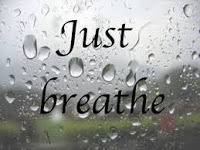
Two mantras. Just eight words for one and two only for the other. But, each one makes me slow down, rethink my position, consider my surroundings, and get centered with myself.
"Just do the next thing on the list" and "just breathe". The first makes me think rationally about the things I need to accomplish. I don't make a giant goal, like "Finish my novel". The next thing on my list is a doable goal, like "Finish this chapter" or "Figure out who should die". Making the goals surmountable makes me feel great when I reach them. And through it all, I remember to "just breathe".
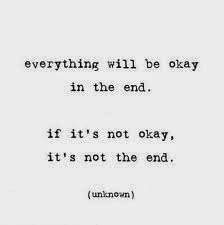 Medical journals all say the same thing as my brilliant and insightful mum: taking a deep breath and forcing air into your lungs awakens your brain and stimulates your creative center. So for me, "just breathe" means just that: take a deep breath and close your eyes. Let the breath out slowly. Then grab that laptop and let the creative forces sweep you away. This happens for me every time. I hope it always does.
Medical journals all say the same thing as my brilliant and insightful mum: taking a deep breath and forcing air into your lungs awakens your brain and stimulates your creative center. So for me, "just breathe" means just that: take a deep breath and close your eyes. Let the breath out slowly. Then grab that laptop and let the creative forces sweep you away. This happens for me every time. I hope it always does.
Also, I have recently added a new mantra to my list and I think it fits perfectly with the others.
What do you think?
In times like this, when I am running my hands through my hair and chasing the family out of the living room, I am so lucky to have the mum I have. Her words flood me just as surely as the Beatles' Mother Mary coming to me, speaking words of wisdom and calming me the hell down.

Two mantras. Just eight words for one and two only for the other. But, each one makes me slow down, rethink my position, consider my surroundings, and get centered with myself.
"Just do the next thing on the list" and "just breathe". The first makes me think rationally about the things I need to accomplish. I don't make a giant goal, like "Finish my novel". The next thing on my list is a doable goal, like "Finish this chapter" or "Figure out who should die". Making the goals surmountable makes me feel great when I reach them. And through it all, I remember to "just breathe".
 Medical journals all say the same thing as my brilliant and insightful mum: taking a deep breath and forcing air into your lungs awakens your brain and stimulates your creative center. So for me, "just breathe" means just that: take a deep breath and close your eyes. Let the breath out slowly. Then grab that laptop and let the creative forces sweep you away. This happens for me every time. I hope it always does.
Medical journals all say the same thing as my brilliant and insightful mum: taking a deep breath and forcing air into your lungs awakens your brain and stimulates your creative center. So for me, "just breathe" means just that: take a deep breath and close your eyes. Let the breath out slowly. Then grab that laptop and let the creative forces sweep you away. This happens for me every time. I hope it always does.Also, I have recently added a new mantra to my list and I think it fits perfectly with the others.
What do you think?
Published on October 06, 2013 05:00
October 4, 2013
The Writer's Alphabet - I is for Indie Houses
Okay, picture this: the time period was three years ago. The setting was a struggling writer's work computer. The event was my emails. All three dozen of them. All rejections. Two requests for partials, then one exciting request for a full from a HUGE house (Harlequin Teen). Then the rejection from even them. Struggling Writer is trying to "stay in the moment" and "do the next thing on the list" (Mummy's words), and is failing. Then Struggling Writer types "independent publishers" into her search engine....and the sun comes out.

I submitted my first manuscript, SPELLBOUND, to a small house named Astraea Press. The email I received back was encouraging, insistent, and life-changing, as it turns out. Not only did they like my work, they were offering me a contract. I would be published, both digitally and in print! Thus began my love affair with Indie Houses.
Since then, I have published six books with four different indies, (try them yourself, below!) and even tried the self-publishing thing. But, I am going back to my roots, and my tenth novel will be published this month with Eskape Press. I'm thrilled, still and always, that the indie houses have loved me, embraced me actually, and claimed me as one of them. And I am. I may possibly publish with a more traditional house in my lifetime, but I will always come home to my indie roots.
If you are considering a contract with one of these amazing houses, let me encourage you to go for it! The benefits are endless and unequaled in the traditional world. Your work comes out in a few months, as opposed to a few years. You retain much of your own creative control. I have new author friends, colleagues who know my pain and share my joy. I am represented by talented artists and dedicated editors who make creating a perfect final product as important as I do. And I am loved by publishing houses that think I am the shit. And that helps me think I am the shit. And as a result, I think I write novels that are the shit.
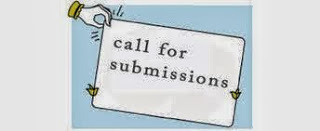 I owe it all to the indie houses. If you want to be part of a supportive, encouraging group, come on over. It may be time for you to get your Indie on, too!
I owe it all to the indie houses. If you want to be part of a supportive, encouraging group, come on over. It may be time for you to get your Indie on, too!
http://www.astraeapress.com/submissions.html
http://ftp.eskapepress.com/Submissions.html
http://store.secretcravingspublishing.com/index.php?main_page=page&id=4
http://musapublishing.blogspot.com/p/submissions.html

I submitted my first manuscript, SPELLBOUND, to a small house named Astraea Press. The email I received back was encouraging, insistent, and life-changing, as it turns out. Not only did they like my work, they were offering me a contract. I would be published, both digitally and in print! Thus began my love affair with Indie Houses.
Since then, I have published six books with four different indies, (try them yourself, below!) and even tried the self-publishing thing. But, I am going back to my roots, and my tenth novel will be published this month with Eskape Press. I'm thrilled, still and always, that the indie houses have loved me, embraced me actually, and claimed me as one of them. And I am. I may possibly publish with a more traditional house in my lifetime, but I will always come home to my indie roots.
If you are considering a contract with one of these amazing houses, let me encourage you to go for it! The benefits are endless and unequaled in the traditional world. Your work comes out in a few months, as opposed to a few years. You retain much of your own creative control. I have new author friends, colleagues who know my pain and share my joy. I am represented by talented artists and dedicated editors who make creating a perfect final product as important as I do. And I am loved by publishing houses that think I am the shit. And that helps me think I am the shit. And as a result, I think I write novels that are the shit.
 I owe it all to the indie houses. If you want to be part of a supportive, encouraging group, come on over. It may be time for you to get your Indie on, too!
I owe it all to the indie houses. If you want to be part of a supportive, encouraging group, come on over. It may be time for you to get your Indie on, too!http://www.astraeapress.com/submissions.html
http://ftp.eskapepress.com/Submissions.html
http://store.secretcravingspublishing.com/index.php?main_page=page&id=4
http://musapublishing.blogspot.com/p/submissions.html
Published on October 04, 2013 22:36
September 29, 2013
The Writer's Alphabet - H is for HEA
H is for HEA. Or, HFN, depending on your story arc and if your work is part of a series. LOL, don't freak out. I can explain it all.
 HEA is short for Happily Ever After. If you write for some publishers, such as Harlequin, Avon Romance, or Harper Collins, the HEA is a compulsory component. If your character doesn't get the girl or man of his or her dreams, you either cannot publish with them or you need to rewrite the ending.
HEA is short for Happily Ever After. If you write for some publishers, such as Harlequin, Avon Romance, or Harper Collins, the HEA is a compulsory component. If your character doesn't get the girl or man of his or her dreams, you either cannot publish with them or you need to rewrite the ending.
HEA is a staple of your writing diet if you are a romance author, a historical fiction writer, or a writer of any genre where the romance is the compelling factor. Now, I write several different genres and in all of them, romance has a part. But, the compelling part of my stories is not necessarily the lovey-dovey. In my paranormals, the magic is the kicker. The horrors, well, the horror is the best part. But, there is always a little romance in there. In most cases, my character's unexplainable and sometimes annoying desire for someone is the one thing that makes them human, that fleshes out their stories and brings them to life for the reader. Longing, desire, coveting...these are all uniquely human traits. Animals don't do that. We do.
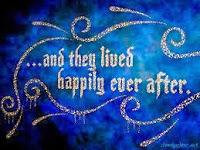
So, what then, is HFN. Easy. Happy for Now. This is great for a series where you plan to maybe kill off the character, or have your heroine land in the arms of the decidedly roguish man and not the steadfast one who seemed so perfect for her in the beginning. But, will he remain faithful? Ah, that is the question for an HFN novel.
As a horror writer, I prefer a little-known acronym: HNE. Happily never after. *giggles evilly*
 HEA is short for Happily Ever After. If you write for some publishers, such as Harlequin, Avon Romance, or Harper Collins, the HEA is a compulsory component. If your character doesn't get the girl or man of his or her dreams, you either cannot publish with them or you need to rewrite the ending.
HEA is short for Happily Ever After. If you write for some publishers, such as Harlequin, Avon Romance, or Harper Collins, the HEA is a compulsory component. If your character doesn't get the girl or man of his or her dreams, you either cannot publish with them or you need to rewrite the ending. HEA is a staple of your writing diet if you are a romance author, a historical fiction writer, or a writer of any genre where the romance is the compelling factor. Now, I write several different genres and in all of them, romance has a part. But, the compelling part of my stories is not necessarily the lovey-dovey. In my paranormals, the magic is the kicker. The horrors, well, the horror is the best part. But, there is always a little romance in there. In most cases, my character's unexplainable and sometimes annoying desire for someone is the one thing that makes them human, that fleshes out their stories and brings them to life for the reader. Longing, desire, coveting...these are all uniquely human traits. Animals don't do that. We do.

So, what then, is HFN. Easy. Happy for Now. This is great for a series where you plan to maybe kill off the character, or have your heroine land in the arms of the decidedly roguish man and not the steadfast one who seemed so perfect for her in the beginning. But, will he remain faithful? Ah, that is the question for an HFN novel.
As a horror writer, I prefer a little-known acronym: HNE. Happily never after. *giggles evilly*
Published on September 29, 2013 05:00



